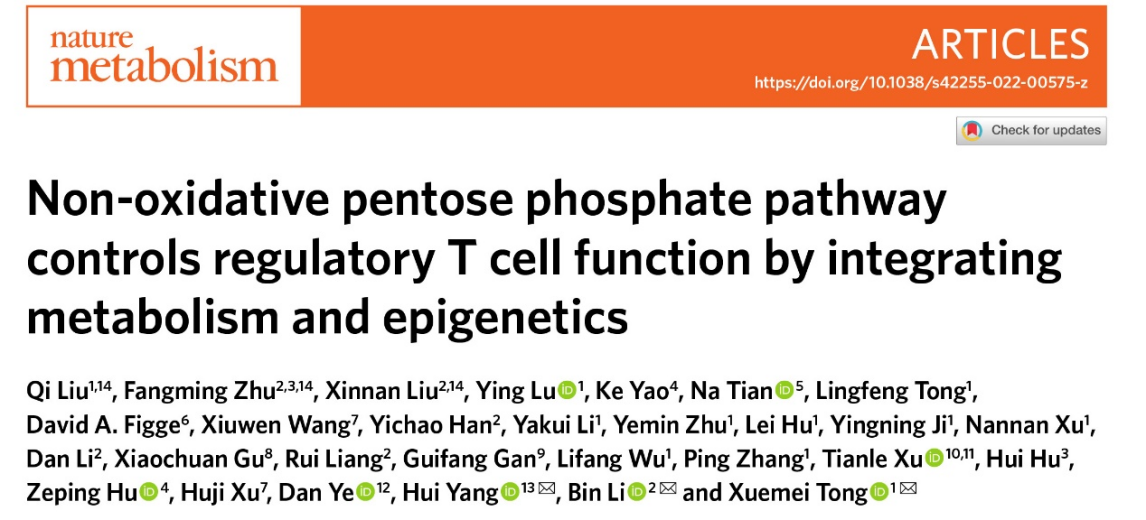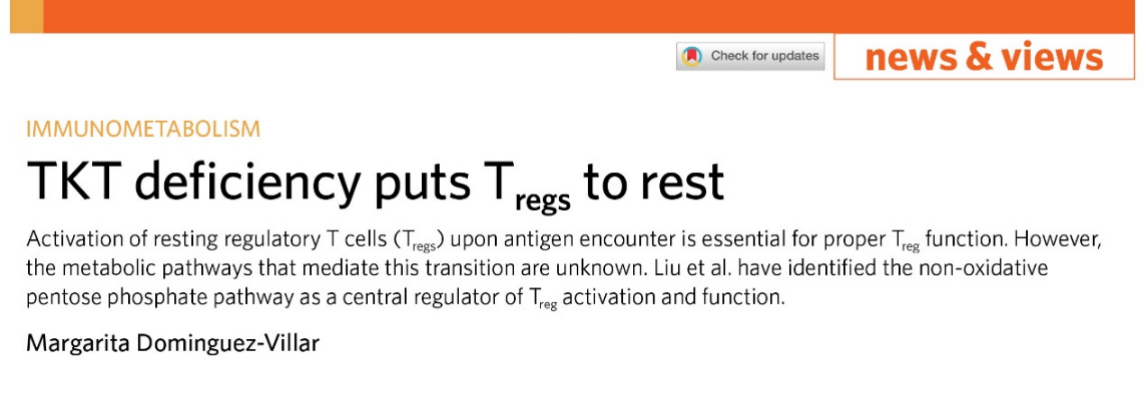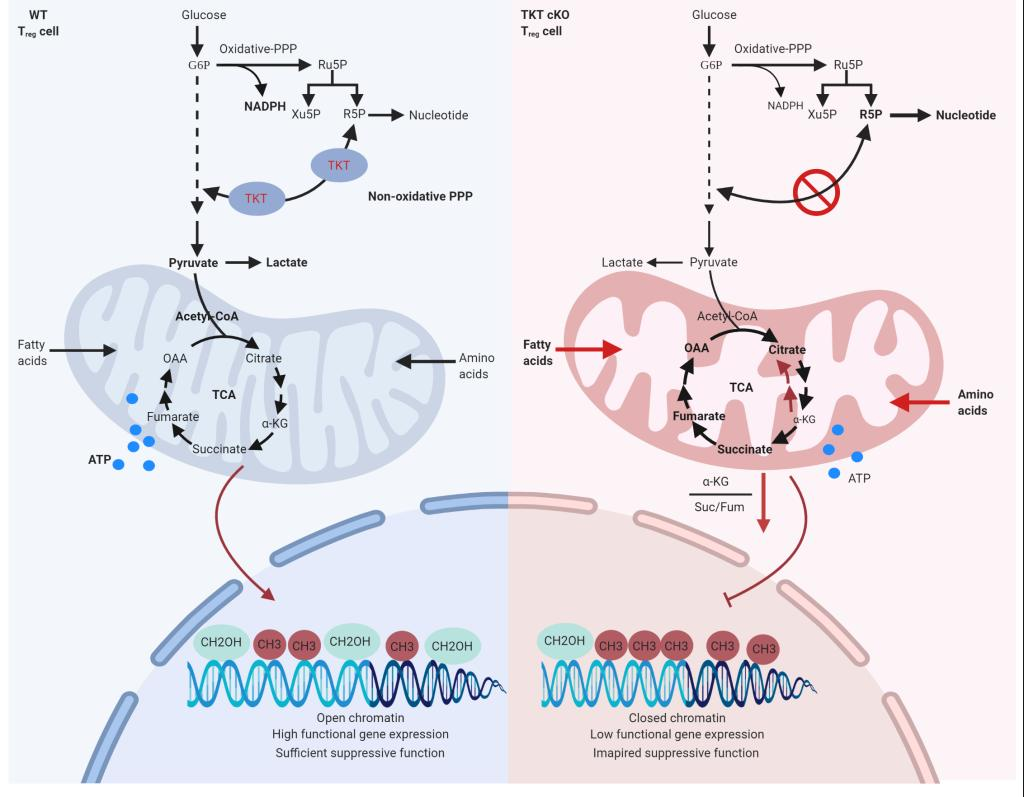On 23 May, Professor Tong Xuemei research group with the Biochemistry and Molecular Cell Biology of College of Basic Medical Sciences of SJTUSM, Research Fellow Li Bin research group with Shanghai Institute on Immunology, and Research Fellow Yang Hui with Huashan Hospital/Institute for Translational Brain Research affiliated to Fudan University jointly publish online in the “Nature Metabolism”journal the research paper titled “Non-oxidative pentose phosphate pathway controls regulatory T cell function by integrating metabolism and epigenetics”, which reveals the new role and mechanism of non-oxidative pentose phosphate pathway (non-oxidative PPP) controlling regulatory T cell (Treg)function. Doctor Margarita Dominguez-Villar with the Imperial College London writes the special comment “News & Views” in same issue of the journal “Nature Metabolism”, holding that this research article discovers that non-oxidative PPP is a central regulator in Treg activation and functional regulation.

Treg expressing specificity transcription factor Foxp3 is one category CD4T cell sub-population with immunosuppression function, which functions to sustain the steady state of human immune system and prevent immunological stress from inducing immune disease. Non-oxidative PPP includes 5-step reversible reactions catalyzed by 4 metabolic enzymes, and can meet cell’s functional demands by changing flow direction of metabolite. It remains unclear as regard to whether the non-oxidative PPP participates in regulation on function of Treg.
Transketolase (TKT) is the metabolic enzyme in non-oxidative PPP for catalyzing 2-step reversible reactions. Professor Tong Xuemei research group has found TKT’s important role in regulating the balance of glucose and lipid metabolism in liver, fat and intestinal tract (Li M et al, Cancer Research, 2019; Tian N et al, Diabetes, 2020; Tian N et al, Cell Death & Disease, 2021). In this research, mice specifically knocked out TKT by Treg develop severe auto-immune disease 3 weeks after birth, and die in succession after weaning, and their phenotype is similar to those mice deficient of Foxp3 gene.

Further study finds that, without changing the Treg number and level of the transcription factor Foxp3, knockout of TKT suppresses the immunosuppression function of Treg. The mechanism lies in: deficiency of TKT results in decrease of Treg’s NADPH and increase of oxidative stress, reduction of glucose’s oxidation in mitochondria, increase in fatty acid oxidation, remarkable strengthening of amino acid catabolism, as well as in catabolism remodeling damaging function of mitochondria. Meanwhile, the reductive TCA cycle induced by oxidation stress and mitochondria damage results in reduction of a-ketoglutaric acid/succinic acid and α-Ketoglutaric acid ratio, and in increased DNA methylation, suppressing the gene expression of Treg characteristic function and resulting in the loss of its immune suppression function.
The research finds that, the Transaldolase (TAL) in the non-oxidative PPP is also indispensable to sustain the gene expression of responsive Treg characteristic function. In addition, in the Treg cells of peripheral blood of autoimmune disease patient, there is remarkable reduction of TKT level.
The research reveals, for the first time, non-oxidative PPP’s integrating metabolism and epigenetic modification of three nutrients to control Treg function, which looks to provide a new thinking for preventing and curing autoimmune disease and other immunity related disease through regulating Treg function.

Non-oxidative PPP controls Treg function via integrating metaolism group and epigenetics group
Liu Qi, doctoral student with SJTUSM, Zhu Fangming, doctoral student with University of Alabama at Birmingham, and Liu Xinnan, doctoral student with Shanghai Institute on Immunology are the co first authors of this research paper. This research project has received great assistance from partners including research fellow Ye Dan with Shanghai Medical College of Fudan University, Xu Huji, director of Department of Rheumatology and Immunology of Changzheng Hospital affiliated to the Naval Medical University, Shen Nan, director of Renj Hospital affiliated to Shanghai Jiaotong University, Professor Xu Tianle with College of Basic Medical Sciences of SJTUSM, Hu Zeping, research fellow with School of Medicine of Tsinghua University, and Professor Hu Hui with University of Alabama at Birmingham, etc. The corresponding author is Professor Tong Xuemei, research fellow Li Bin, and research fellow Yang Hui. This research is supported by the State Key Project of Research and Development Plan, National Natural Science Foundation of China (NSFC), and the Science and Technology Commission of Shanghai Municipality.

